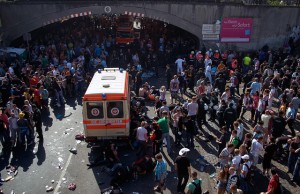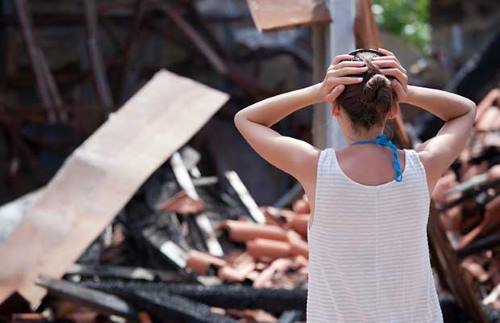Members of the preparedness community often remind people to be prepared, and to focus on the survival basics; and nothing is more basic than food, water, first aid, security/self-defense and hygiene/sanitation. If you have considered these things, and secured the proper supplies as part of your preparations and planning, then you are far ahead of 99% of the population. No it’s not a typo, and I’m not exaggerating. According to the U.S. Census there are an estimated 315.9 million people in the U.S.
Of those, less than 1%, or about 3 million, are prepared for a natural or man-made disaster. These statistics are pretty shocking, especially when you consider that the majority of these people live and work in highly populated urban centers. By implication, if less than 1% of the population is prepared, then just over 99% is unprepared – that is almost everybody! Even assuming that the estimated number of “prepared” people is somehow vastly underestimated, which I really don’t believe to be the case, the number of unprepared people is just so disproportionately large, we can surely anticipate some very difficult and dangerous scenarios that after any major crisis. Here is some of what we can expect in the aftermath of a natural or man-made disaster.
- If the crisis lasts longer than a few days, the vast majority of the population will be completely ill-equipped to effectively deal with the event, and/or the resulting aftermath.
- Electrical, water, sewer, garbage pick-up and other vital public services will be suspended or drastically cut-back, and may not be reestablished for quite some time.
- The supply chain will be partially disrupted or completely shut-down.
- In the absence of this vital infrastructure, food, water and other medical and sanitary supplies will quickly become unavailable.
- Most stores will promptly be stripped bare. Think of your local bank, if 99% of their depositors all of a sudden decided to withdraw money, the bank would be unable to pay everybody. Why? The bank operates on the assumption that the majority of their customers will never have a reason to all show up at the same time, and they plan accordingly. Stores do the same, maintaining limited inventories to effectively reduce their costs and the amount of necessary storage space, since deliveries arrive almost daily and are tailored to the typical levels of consumer demand. During a disaster, however, deliveries may not arrive for many days, weeks or maybe even longer.
- The stores that are not stripped clean will be looted and destroyed by the criminals. This is a very common phenomenon, during times of trouble we can expect to see the worst in people, and some people at their worst.
- After any major crisis, even the law-abiding members of the 99% will find themselves in a very desperate and dangerous situation where they are forced to leave the relative safety of their homes to venture out into the chaos in a frantic attempt to secure even just a small amount of food, water and other necessary supplies.
 During those difficult moments, people will probably find themselves without cash or other means of paying for the necessities they so desperately need. As we all know, most people don’t carry cash and probably don’t have any at home either. Many pay, even for small purchases, with a credit or debit card. If the power is out, or if communications are somehow disrupted, some goods may still be available for sale, but only for cash, something the majority of people will not have, and will not be able to obtain from their ATMs anytime soon.
During those difficult moments, people will probably find themselves without cash or other means of paying for the necessities they so desperately need. As we all know, most people don’t carry cash and probably don’t have any at home either. Many pay, even for small purchases, with a credit or debit card. If the power is out, or if communications are somehow disrupted, some goods may still be available for sale, but only for cash, something the majority of people will not have, and will not be able to obtain from their ATMs anytime soon.- Police, fire, paramedics and other first responders will be overwhelmed and vastly understaffed. This is not hard to imagine since many states are deeply in debt, many are bordering on bankruptcy, and almost none have managed to escape the deep budget cuts that have affected even the most basic public services. After any major crisis many public servants will be asked to do the impossible, and I am sure that they will give it a heroic effort, but every human body has limits and the clock only has 24 hours. Without the proper staff, and the proper equipment, many calls for help and emergency services will be delayed, or worse yet, will go unanswered.
- The police will not be able to protect everybody from the resulting violence and unrestrained crime spree. The chaos and confusion will represent a wind-fall for criminals, charlatans and other societal parasites. The unlawful elements are always among us, but during normal times they usually try to stay under the radar to avoid detection and arrest. During a public emergency, however, these vermin will operate out in the open and will not hesitate to take whatever they want, however they want it, and with little or no regard for others, or the rule of law.
 People who are prepared will be forced to hide from the hordes of criminals, looters, and just plain desperate folk. If you have supplies, you will be a target of interest for just about anyone who is looking for what you have. If you are unable to leave to a safer, more secure and less populated area that is willing to accept you, you will have very few options. One of those options will be to shelter in place (Bug-In) and keep a very low profile. (Bugging-in is the act of retreating into your home, or other secure location, and keeping an extremely low profile in an effort to remain undetected until the worse moments pass.)
People who are prepared will be forced to hide from the hordes of criminals, looters, and just plain desperate folk. If you have supplies, you will be a target of interest for just about anyone who is looking for what you have. If you are unable to leave to a safer, more secure and less populated area that is willing to accept you, you will have very few options. One of those options will be to shelter in place (Bug-In) and keep a very low profile. (Bugging-in is the act of retreating into your home, or other secure location, and keeping an extremely low profile in an effort to remain undetected until the worse moments pass.)- If you’re somehow able to get out of an urban area in one piece, and you manage to make it to the countryside, don’t expect a warm welcome. People outside the cities are not eagerly awaiting your arrival. In fact, they will probably not welcome you at all. You represent an unacceptably high level of risk to their security and well-being. And in all fairness, during a disaster, it will often be difficult to distinguish friend from foe, why should they take the risk? Unless you have an established relationship and predetermined plans with someone in a rural community, think long and hard before showing up on someone’s doorsteps unannounced – they may confuse you for a looter.
That was a pretty brutal, but fair assessment of the potential reality after a crisis. Now for the good news – you have choices and you have options. Your basic preparations will only get you part of the way. To get the rest of the way, you must make plans and prepare for how you will deal with the unprepared after any major disaster. Here are 5 tips and ideas to get you started:
 Assess and understand your vulnerabilities in advance of any disaster. Don’t wait until the last minute and think that you will be able to play it by ear. You can of course do it that way, but you will drastically reduce your viable options. Think it through now, make your plans, and always have back-up plans.
Assess and understand your vulnerabilities in advance of any disaster. Don’t wait until the last minute and think that you will be able to play it by ear. You can of course do it that way, but you will drastically reduce your viable options. Think it through now, make your plans, and always have back-up plans.- Secure the core survival elements – food, water, first aid, security/self-defense and hygiene/sanitation. These preparations are the foundation upon which all else is constructed. Without the survival basics, you will have firmly established yourself in the 99% camp.
- Have a plan for bugging-in, bugging –out, and getting back home. There are times when it is appropriate to leave, yes even if you don’t have a place to go. If you are unlucky enough to lose your home to fire, destruction, criminals, etc. you will be forced to leave. This is where good planning comes in. Sheltering in place requires a solid stock of supplies and a good plan to remain safe and undetected. Bugging-out requires supplies, a plan, a destination, an alternate plan and destination, and the means to get you there safely. Plan, plan, plan, and always expect the unexpected.
- Make sure that your plans are realistic and viable. I know people that have drafted incredibly detailed plans, had the pages laminated, studied the steps down to the most minor details and have set themselves up for a miserable failure because they never tested their plans. Have you ever planned a vacation, and nothing works out the way you envisioned? Of course you have, that is life, and things are almost never what we expect them to be. Having an untested plan is almost as good as having no plan at all. Test your plan and then test it again. See just how realistic your expectations of yourself and others are. And if your plan fails, that is actually a very good thing because now you have an opportunity to fix, whatever needs fixing, while time is still on your side.
- Reach out and join a group, or form your own. During difficult times cooperation is key. If you hope to go it alone you may quickly realize that lone wolf style survival only works in the movies. In real life no one person can do it all. Reaching out to other like-minded people in advance will help you form relationships that will come in handy when times get tough. But don’t underestimate your ability to influence others. Teach what you know to anyone who is willing to learn. I’m not suggesting that you hang a banner in front of your house advertising that you’re a Prepper, but there are many good people who are eager to learn how to prepare, and your assistance may help one more family get prepared.
Stay Safe & Be Prepared.
Other useful resources:
Blackout USA (EMP survival and preparedness)
Conquering the coming collapse (Financial advice and preparedness )
Liberty Generator (Easy DIY to build your own off-grid energy source)
Backyard Liberty (Easy and cheap DIY Aquaponic system to grow your organic and living food bank)
Source: theprepperjournal.com
About The Author: Richard is a practicing attorney and a survival and firearms enthusiast; he currently teaches and consults in the areas of urban survival planning and preparation.For the latest news and updates connect with Richard on www.survivingdoomsdaythebook.com



3 Replies to “Disaster Aftermath: What to Expect and How to Prepare”